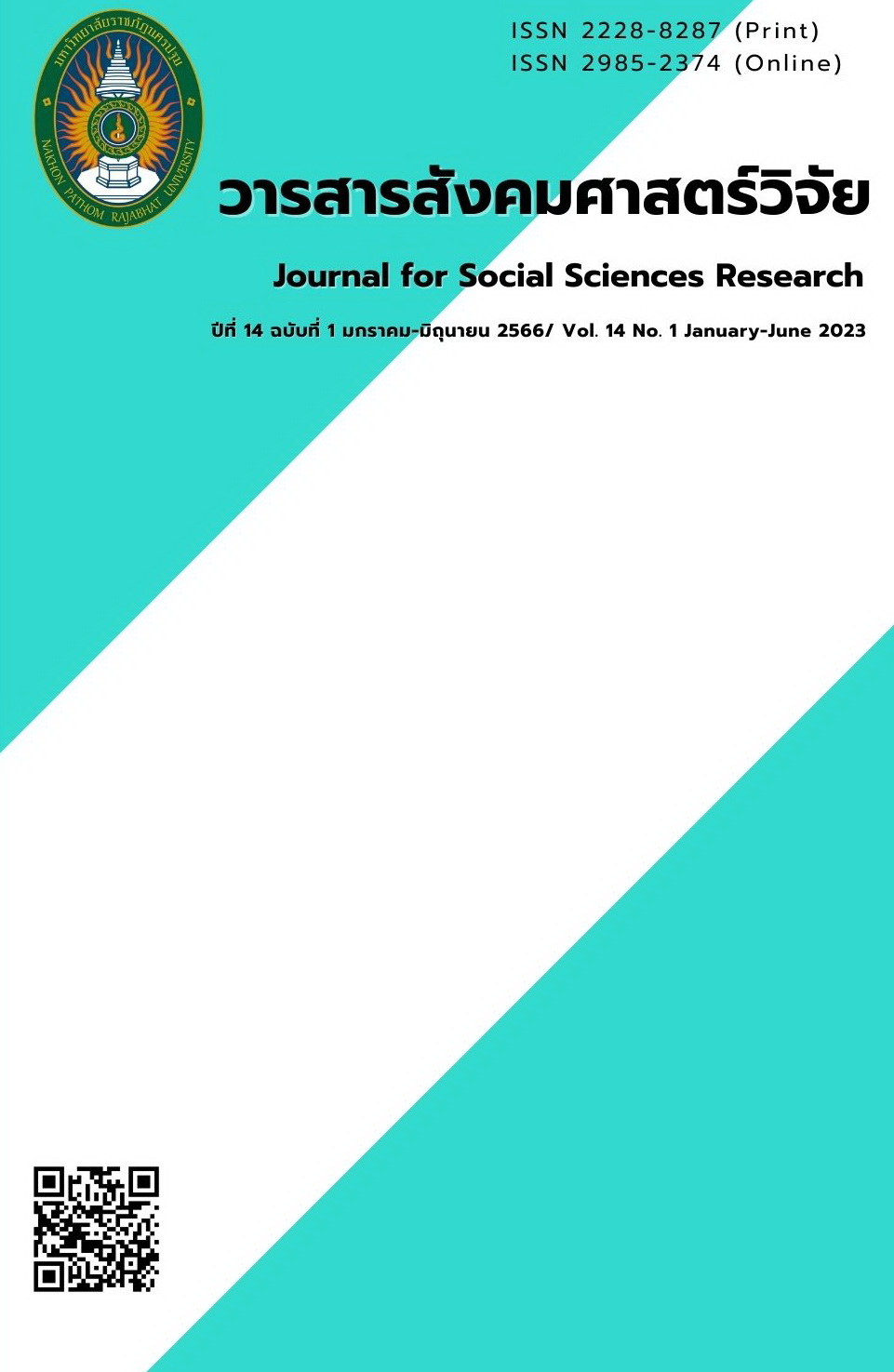THE INFLUENCE OF ENVIRONMENTAL FACTORS ON ENTREPRENEURIAL INTENTION OF STUDENTS IN FACULTY OF MANAGEMENT SCIENCES, PRINCESS OF NARADHIWAS UNIVERSITY
Main Article Content
Abstract
The purpose of this study was to determine the environmental factors that influence entrepreneurial intention. The samples were 352 students in the Faculty of Management Sciences, Princess of Naradhiwas University. The research tool was an online questionnaire with a five-point rating scale. The data were analyzed using frequency, percentage, mean, standard deviation, and multiple regression analysis (enter method). The results of the study revealed that the environmental factors that had a significant influence on entrepreneurial intention are: perceived educational support (b = 0.346) and perceived family support (b = 0.381). The two variables could predict the level of entrepreneurial intention at 45.50 percent. The equation in raw scores was as follows:
Ytot = 1.317 + 0.346PES* + 0.381PFS* - 0.007PSS
Article Details

This work is licensed under a Creative Commons Attribution-NonCommercial-NoDerivatives 4.0 International License.
บทความที่ได้รับการตีพิมพ์เป็นลิขสิทธิ์ของมหาวิทยาลัยราชภัฏนครปฐม
เนื้อหาของแต่ละบทความเป็นทัศนะของผู้เขียน ซึ่งที่ปรึกษา บรรณาธิการ กองบรรณาธิการ และคณะกรรมการบริหารวารสารไม่จำเป็นต้องเห็นด้วย หรือร่วมรับผิดชอบใดๆ
References
กองส่งเสริมวิชาการและงานทะเบียน มหาวิทยาลัยนราธิวาสราชนครินทร์. (2564). สถิตินักศึกษา. ค้นเมื่อ 1 เมษายน 2565, จาก https://www.pnu.ac.th/acadamic/
ธาดาธิเบศร์ ภูทอง และสวมล ศิริกัณฑ์. (2019). อิทธิพลของการสนับสนุนทางสังคม สนับสนุนทางด้านการศึกษา และความเชื่อมั่นในตนเองต่อความตั้งใจที่จะเป็นผู้ประกอบการธุรกิจบริการและที่พักรุ่นเยาว์ของกลุ่มวัยรุ่นเจเนอเรชั่นซี. Veridian E-Journal, 12 (4), 799-829.
มหาวิทยาลัยนราธิวาสราชนครินทร์. (2566). แผนกลยุทธ์ 5 ปีของมหาวิทยาลัยนราธิวาสราชนครินทร์ ประจำปีงบประมาณ 2565-2569. ค้นเมื่อ 7 เมษายน 2566, จาก https://www.pnu.ac.th/wp-content/uploads/2021/11/1%20%แผนกลยุทธ์การพัฒนามหาวิทยาลัย.pdf
ยุทธ ไกยวรรณ์. (2556). การวิเคราะห์สถิติหลายตัวแปรสำหรับงานวิจัย. กรุงเทพฯ: สำนักพิมพ์แห่งจุฬาลงกรณ์มหาวิทยาลัย.
Al Issa, H. E. (2020). The influence of education and environmental support on entrepreneurial intentions. International Journal of Economics and Business Administration, 8 (4), 946-965.
Annisa, D. N., Tentama, F. & Bashori, K. (2021). The role of family support and internal locus of control in entrepreneurial intention of vocational high school students. International Journal of Evaluation and Research in Education, 10 (2), 381-388.
Budiyono, H. & Setyawasih, R. (2020). Entrepreneurial intentions among entrepreneurship course students shaped by individual effects and family support. In Proceedings of the 1st International Conference on Recent Innovations (ICRI 2018) (26-28 September pp. 2109-2119). Jakarta: Esa Unggul University.
Colman, M. et al. (2019). The impact of perceived innovativeness, perceived risk and perceived educational support on university student’s entrepreneurial intention. The Business & Management Review, 10 (2), 217-223.
Fayolle, A. (2013). Personal views on the future of entrepreneurship education. Entrepreneurship and Regional Development, 25 (7), 692-701.
Hair, J. F. et al. (2010). Multivariate data analysis: A global perspective (7th ed.). New Jersey: Pearson Prentice Hall.
Handayati, P. et al. (2020). Does entrepreneurship education promote vocational students’ entrepreneurial mindset?. Heliyon, 6 (11), 1-7.
Ikhram, A. D. & Novadjaja, L. H. (2020). The effect of entrepreneurial knowledge on entrepreneurial intention with the moderation of family support (A case study on university students in Indonesia). Asia Pacific Management and Business Application, 8 (3), 169-180.
Jayamini, G. P. C. & Dilrukshi, M. G. M. (2020). Determinants of entrepreneurial intention among Management Undergraduates in University of Ruhuna. In Proceedings of 9th International Conference on Management and Economics (26 July pp. 725-732). Retrieved 15 May 2022, from http://ir.lib.ruh.ac.lk/handle/iruor/3878
Joseph, N. (2013). Motivational factors relating to entrepreneurial intention: A study of postgraduate management students in India. ABAC Journal, 33 (1), 82-97.
Karabulut, A. T. (2016). Personality traits on entrepreneurial intention. Procedia-Social and Behavioral Sciences, 229, 12-21.
Nasip, S. et al. (2017). Psychological characteristics and entrepreneurial intention: A study among university students in North Borneo, Malaysia. Education Training, 59 (7/8), 825-840.
Ononye, U. et al. (2022). Family support, psychological capital, and start-up formation. Problems and Perspectives in Management, 20 (1), 342-352.
Otchengco, A. M. Jr. & Akiate, Y. W. D. (2021). Entrepreneurial intentions on perceived behavioral control and personal attitude: moderated by structural support. Asia Pacific Journal of Innovation and Entrepreneurship, 15 (1), 14-25.
Ozelturkay, E. Y., Ozekenci, E. K. & Yalcintas, D. (2019). Determining the factors that affect entrepreneurial intention: A research on university students. Journal of Youth Research, 7 (18), 41-58.
Phuong, N. N. D., Van, Q. N. T. & Dung, N. D. (2020). The effect of perceived educational support, self-efficacy and planned behavior predictors on entrepreneurial intention of Ho Chi Minh City University students. Ho Chi Minh City Open University Journal of Science-Economics and Business Administration, 10 (1), 133-147.
Sanjaya, E. L., Suminar, D. R. & Fardana, N. A. (2021). Father nurturance as moderators of perceived family support for college students’ entrepreneurial intentions. Psychosophia: Journal of Psychology, Religion, and Humanity, 3 (2), 84-94.
Shen, T., Osorio, A. E. & Settles, A. (2017). Does family support matter? The influence of support factors on entrepreneurial attitudes and intentions of college students. Academy of Entrepreneurship Journal, 23 (1), 24-43.
Shi, L., Yao, X. & Wu, W. (2020). Perceived university support, entrepreneurial self-efficacy, heterogeneous entrepreneurial intentions in entrepreneurship education: The moderating role of the Chinese sense of face. Journal of Entrepreneurship in Emerging Economies, 12 (2), 205-230.
Tassawa, C. (2019). A structural model for predicting entrepreneurial intention of university students. Humanities, Arts and Social Sciences Studies, 19 (2), 362-386.
Turker, D. & Selcuk, S. S. (2009). Which factors affect entrepreneurial intention of university students?. Journal of European Industrial Training, 33 (2), 142-159.
Wibowo, S. F. et al. (2019). Determinants of entrepreneurial intention among millennial generation in emerging countries. International Journal of Entrepreneurship, 23 (2), 1-10.
Youssef, A. B. et al. (2021). Digitalization of the economy and entrepreneurship intention. Technological Forecasting & Social Change, 164 (5), 1-14. Retrieved 15 May 2022, from https://doi.org/10.1016/j.techfore.2020.120043
Yurtkoru, E. S., Kuşcu, Z. K. & Doğanay, A. (2014). Exploring the antecedents of entrepreneurial intention on Turkish university students. Procedia-Social and Behavioral Sciences, 150, 841-850.


